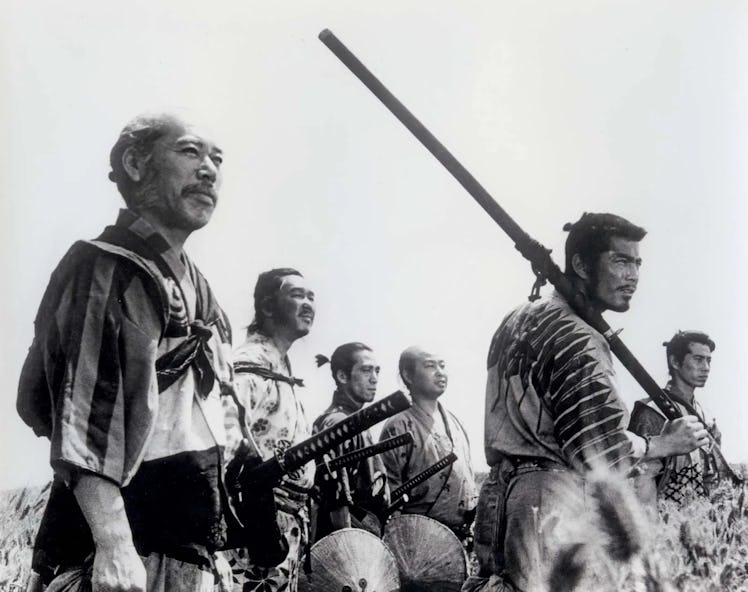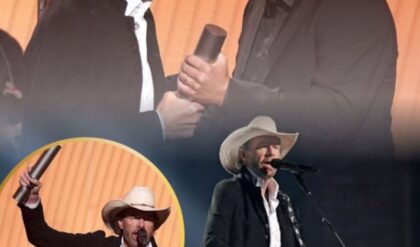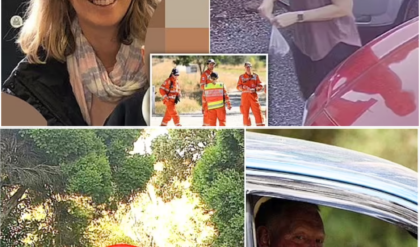70 years later, Akira Kurosawa’s classic is unbeatable.
If there’s one story arc that director Zack Snyder seems obsessed with — whether in his Rebel Moon series or his defunct Justice League universe — it’s the “band of roughneck heroes coming together for the greater good.” He’s not alone. Star Wars creator George Lucas was inspired by the concept, Steven Spielberg used it for the framework of Saving Private Ryan, Pixar absorbed it for A Bug’s Life, the list goes on. But you can trace the inspiration for all of these movies back to one primary source: Akira Kurosawa’s Seven Samurai, one of the most influential movies ever made.
Kurosawa might have a bigger imprint on film than any one else in the history of the art form. The Japanese filmmaker is a favorite of both casual audiences and hardcore cinephiles alike, having given the world Stray Dog, Rashomon, Ikiru, The Hidden Fortress, Yojimbo, High and Low and many more. Very few directors manage to concoct a single film that changes how movies are made on a grand scale — Kurosawa helmed at least a half-dozen.
Seven Samurai, impossibly, stands out among the rest. It’s arguable whether it’s his best film (that choice is usually decided by what era of Kurosawa you prefer, from his outlaw-filled ‘60s and ‘70s, to the more dream-like creations of his later years) but it’s proven to be his most approachable. On a basic level, the narrative of gathering a band of wannabe do-gooders, ne’er-do-wells, and common folk together to ward off some larger threat is a crowd pleaser. It’s a triumph of the underdog and the everyman, one that unites us in shared humanity.
In Kurosawa’s hands though, it’s both a testament to mankind working as one and an epic cinematic masterpiece. Even if you’ve never seen it, pop culture osmosis has likely revealed its plot to you: Desperate to save themselves and their crops from an onslaught of unscrupulous bandits, farmers hire a cheap group of samurai to protect them. Kurosawa is simultaneously operatic and deeply detailed in his approach. Many of the samurai — from Kambei, the old, tired warrior, to Kyuzo, the quiet, talented swordsman — are archetypes, perfect for the grand story turns of defeat, betrayal, and hard-earned victory. The crops that the farmers wish to save, with their eager planting, plentiful harvest, and eventual decay symbolizes life itself in a very unsubtle fashion.
But Kurosawa is also attuned to the minute beauty of things, the pangs of desperation and drips of sweat on a man’s face, or the way a piece of wood shatters when hit with an arrow. His combat and battle sequences seem furious but somehow remain elegant and precise in their chaos. It is a story told in broad strokes, but Kurosawa is always attuned to the pressure of life and mortality, and how honor and duty can weigh a man’s exhausted shoulders down. The world of Seven Samurai is indeed a kind of fable, something destined to be adapted and retold forever. But it’s also lived-in and real, a place where blood flows from a wound and into the earth, and fire is hot to the touch.

The influence of Seven Samurai reverberates even today.
TOHO
The film was the most expensive Japanese movie ever made at that point, and was thankfully rewarded by being the second highest grossing film of 1954 (even outdoing the other Japanese film from that year that made a titanic international splash, Ishiro Honda’s Godzilla). But more important than the box office is what it’s meant to filmmaking since, for those aforementioned examples of its influence are just a drop in the bucket. Everything from westerns like The Magnificent Seven, to sci-fi films from B movie titan Roger Corman, to anime like Samurai 7, and blockbuster video games like Ghost of Tsushima owe their existence to Seven Samurai.
Takashii Miike, director of gory masterpieces like Audition and 13 Assassins, wrote in The Guardian: “I don’t think any Japanese filmmaker can escape the influence of Kurosawa.” However, he would’ve been just as apt to include any filmmaker of any nationality. Kurosawa and Seven Samurai continue to loom as the lifeblood of the medium of film itself.
At the end of the film, Kambei tells one of his remaining fellow samurai: “The victory belongs to those peasants. Not to us.” Seven Samurai is the same way. Its span of influence, now decades after Kurosawa’s passing, reveals a film that belongs to cinema itself and everyone who partakes in it. Kurosawa’s work has gone beyond the reaches of being a single movie or even a single filmography and has instead become a building block for the industry, as steadfast and immovable as the samurai.




